 Liesbeth’s research focuses on developing a deep learning AI algorithm, or an AI model, for the automated scoring of PD-L1 in non-small cell lung cancer (NSCLC) and to then validate and generalize the AI model across different laboratories in the Netherlands. The AI model is trained to identify tumor cells in different tissues and to then calculate the percentage of tumors positive for PD-L1, a vital piece of information in determining the best course of immunotherapy in some cases of NSCLC.
Liesbeth’s research focuses on developing a deep learning AI algorithm, or an AI model, for the automated scoring of PD-L1 in non-small cell lung cancer (NSCLC) and to then validate and generalize the AI model across different laboratories in the Netherlands. The AI model is trained to identify tumor cells in different tissues and to then calculate the percentage of tumors positive for PD-L1, a vital piece of information in determining the best course of immunotherapy in some cases of NSCLC.
Can you please describe your project utilizing AI?
We created an AI model, a deep learning algorithm, with the Aiforia Create software for PD-L1 scoring in NSCLC histology earlier and are now aiming to validate this AI model in other laboratory workups as well, including different antibodies and scanners. We will describe the steps that are needed for adapting an existing AI model to a new, local laboratory workup (domain adaptation).
This is a very relevant research question because many algorithms exist nowadays, but very few are reliable in new circumstances, especially in immunohistochemistry where there is great variation between laboratories. There are no clear guidelines on how to adapt an existing pathology algorithm to a new workup yet.
What do you think makes this project unique?
As far as I know, this is the first multi-centre domain adaptation study for medical image analysis. It answers a relevant question: how does one start using existing algorithm in a previously unseen (by the AI) workflow?
Why did you decide to use the Aiforia software for this?
Easy-to-use, powerful and it permits quick training methods!
How much training data did you need to train the AI model?
74 images were used for designing the base algorithm. For each workup we will use 50 additional slides as potential training data, and 50 slides as validation data.
What was the AI model trained to detect and analyze?
Tissue: high quality tissue (segmentation). Tumor: tumor vs other tissue (segmentation), within the high-quality tissue. Positivity: PD-L1 positive VS negative tumor nuclei (object detection), within the tumor. The outcome is the percentage of PD-L1 positive tumor nuclei.
How did the AI model perform?
For the base AI model (not generalized to the other workups yet): Error % Less than 0.5% for all semantic segmentation layers and about 9% error for object detection. On a whole slide level the agreement to the gold standard is approximately 80%, which is equally accurate as pathologists themselves doing the task.
What was it like working with the Aiforia software and team?
It was a good experience! The scientists and support team at Aiforia respond very quickly and have a lot of technical expertise. It has been very easy to work with Aiforia, I especially like that you don’t have to worry about AI hyper-parameters and storage issues, but can focus on annotations and AI model performance. I also liked the Annotation Assistant very much, it speeds up annotating significantly, by proposing training regions and annotations.
This article was originally published by Aiforia as a blog post on their website, and has been republished here with permission.
Find out more about Aiforia’s AI for image analysis software.
To read more about research from The Pathology Department at Leiden University Medical Center, click here.









